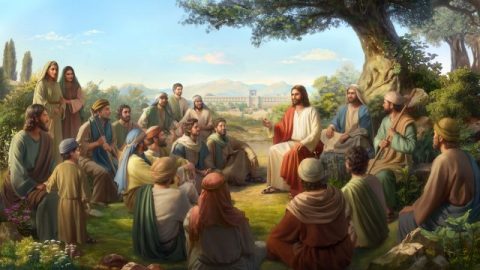

The work Jesus did was in accordance with the needs of man in that age. His task was to redeem humanity, to forgive them their sins, and so His disposition was wholly one of humility, patience, love, piety, forbearance, mercy, and lovingkindness. He brought to humanity abundant grace and blessings, and all the things that people could possibly enjoy, He gave to them for their enjoyment: peace and happiness, His tolerance and love, His mercy and lovingkindness. At the time, the abundance of things to enjoy that people were faced with—the sense of peace and security within their hearts, the feeling of reassurance within their spirits, and their dependence on Jesus the Savior—was all down to the age in which they lived. In the Age of Grace, man had already been corrupted by Satan, and so to achieve the work of redeeming all humanity required an abundance of grace, infinite forbearance and patience, and even more than that, an offering sufficient to atone for humanity’s sins, in order to have an effect. What humanity saw in the Age of Grace was merely My offering of atonement for the sins of humanity: Jesus. All they knew was that God could be merciful and forbearing, and all they saw was the mercy and lovingkindness of Jesus. This was entirely because they were born in the Age of Grace. And so, before they could be redeemed, they had to enjoy the many kinds of grace that Jesus bestowed on them in order to benefit from it. This way, they could be forgiven of their sins through their enjoyment of grace, and could also have the chance to be redeemed through enjoying Jesus’ forbearance and patience. Only through Jesus’ forbearance and patience did they win the right to receive forgiveness and enjoy the abundance of grace bestowed by Jesus. Just as Jesus said: I have come to redeem not the righteous but sinners, to allow sinners to be forgiven of their sins. If, when He became flesh, Jesus had brought the disposition of judgment, curse, and intolerance of man’s offenses, then man would never have had the chance to be redeemed, and would have remained forever sinful. Had this been so, the six-thousand-year management plan would have come to a stop in the Age of Law, and the Age of Law would have been prolonged for six thousand years. Man’s sins would only have grown more numerous and more grievous, and the creation of humanity would have been for naught. Men would only have been able to serve Jehovah under the law, but their sins would have exceeded those of the first created humans. The more Jesus loved mankind, forgiving them their sins and bringing unto them sufficient mercy and lovingkindness, the more mankind was entitled to be saved by Jesus, to be called the lost lambs that Jesus bought back at a great price. Satan could not meddle in this work, for Jesus treated His followers as a loving mother treats the infant at her bosom. He did not grow angry or disdainful toward them, but was full of comfort; He never flew into a rage among them, but forbore with their sins and turned a blind eye to their foolishness and ignorance, to the point of saying, “Forgive others seventy times seven times.” Thus were the hearts of others transformed by His heart, and only thus did people receive forgiveness of their sins through His forbearance.
—The Word, Vol. 1. The Appearance and Work of God. The True Story Behind the Work of the Age of Redemption
The gospel of repentance was preached in the Age of Grace, and provided that man believed, then he would be saved. Today, in place of salvation, there is only talk of conquest and perfection. Never is it said that if one person believes, their whole family will be blessed, or that once saved always saved. Today, no one speaks these words, and such things are outdated. At the time, Jesus’ work was the work to redeem all mankind. The sins of all who believed in Him were forgiven; as long as you believed in Him, He would redeem you; if you believed in Him, you were no longer a sinner, you were relieved of your sins. This is what it meant to be saved, and to be justified by faith. Yet in those who believed, there remained that which was rebellious and opposed God, and which still had to be slowly removed. Salvation did not mean man had been completely gained by Jesus, but that man was no longer of sin, that he had been forgiven his sins. Provided you believed, you would never more be of sin. At the time, Jesus did much work that was incomprehensible to His disciples and said much that people did not understand. This is because, at the time, He did not give any explanation. Thus, several years after He departed, Matthew created a genealogy for Jesus, and others also did much work that was of the will of man. Jesus did not come to perfect and gain man, but to do one stage of work: bringing forth the gospel of the kingdom of heaven and completing the work of the crucifixion. And so, once Jesus was crucified, His work came to a complete end. But in the current stage—the work of conquest—more words must be spoken, more work must be done, and there must be many processes. So too must the mysteries of the work of Jesus and Jehovah be revealed, so that all people may have understanding and clarity in their belief, for this is the work of the last days, and the last days are the end of God’s work, the time of the work’s conclusion. This stage of work will elucidate for you the law of Jehovah and the redemption of Jesus, and is principally so that you may understand the entire work of God’s six-thousand-year management plan, and appreciate all the significance and essence of this six-thousand-year management plan, and understand the purpose of all the work done by Jesus and the words He spoke, and even your blind credence in and adoration of the Bible. All this it will allow you to understand thoroughly. You will come to understand both the work done by Jesus, and the work of God today; you will understand and behold all of the truth, the life, and the way. In the stage of work done by Jesus, why did Jesus depart without doing the concluding work? Because the stage of Jesus’ work was not the work of conclusion. When He was nailed to the cross, His words also came to an end; after His crucifixion, His work completely finished. The current stage is different: Only after the words are spoken to the end and God’s entire work is concluded will His work have finished. During Jesus’ stage of work, there were many words that remained unsaid, or which were not fully articulated. Yet Jesus cared not what He did or did not say, for His ministry was not a ministry of words, and so after He was nailed to the cross, He departed. That stage of work was chiefly for the sake of the crucifixion, and is unlike the current stage. This current stage of work is principally for the sake of completion, of clearing up, and of bringing all work to a conclusion. If the words are not spoken to their very end, there will be no way of concluding this work, for in this stage of work all work is brought to an end and accomplished using words. At the time, Jesus did much work that was incomprehensible to man. He departed quietly, and today there are still many who do not understand His words, whose understanding is erroneous yet still they believe it to be correct, and do not know that they are wrong. In the end, this current stage will bring God’s work to a complete end, and will provide its conclusion. All will come to understand and know of God’s management plan. The notions within man, his intentions, his erroneous understanding, his notions about the work of Jehovah and Jesus, his views about the Gentiles, and his other deviations and errors will be corrected. And man will understand all the right paths of life, and all the work done by God, and the entire truth. When that happens, this stage of work will come to an end.
—The Word, Vol. 1. The Appearance and Work of God. The Vision of God's Work (2)
The work of the last days is to speak words. Great changes can be effected in man by means of words. The changes now effected in these people upon their accepting these words are much greater than those effected in people upon their accepting the signs and wonders of the Age of Grace. For, in the Age of Grace, the demons were cast out from man with the laying on of hands and prayer, but the corrupt dispositions within man still remained. Man was healed of his sickness and forgiven his sins, but as for just how man was to be purged of the corrupt satanic dispositions within him, this work had yet to be done. Man was only saved and forgiven his sins for his faith, but the sinful nature of man was not extirpated and still remained within him. The sins of man were forgiven through the agency of the incarnate God, but this did not mean that man no longer had sin within him. The sins of man could be forgiven through the sin offering, but as for just how man can be made to sin no more, and how his sinful nature may be extirpated completely and transformed, he has no way of solving this problem. The sins of man were forgiven, and this is because of the work of God’s crucifixion, but man continued to live within his corrupt satanic disposition of old. This being so, man must be completely saved from his corrupt satanic disposition, so that his sinful nature may be completely extirpated, never to develop again, thus enabling the disposition of man to be transformed. This would require man to grasp the path of growth in life, to grasp the way of life, and to grasp the way to change his disposition. Furthermore, it would require man to act in accordance with this path, so that his disposition may gradually be changed and he may live under the shining of the light, so that all that he does may be in accord with the will of God, so that he may cast away his corrupt satanic disposition, and so that he may break free from Satan’s influence of darkness, thereby emerging fully from sin. Only then will man receive complete salvation. At the time that Jesus was doing His work, man’s knowledge of Him was still vague and unclear. Man always believed Him to be the son of David, and proclaimed Him to be a great prophet, the benevolent Lord who redeemed man’s sins. Some, on the strength of their faith, were healed just from touching the edge of His garment; the blind could see and even the dead could be restored to life. However, man was unable to discover the corrupt satanic disposition deeply rooted within himself, neither did he know how to cast it away. Man received much grace, such as the peace and happiness of the flesh, the faith of one member bringing blessing on an entire family, the healing of sickness, and so on. The rest were the good deeds of man and his godly appearance; if someone could live on the basis of these, they were considered an acceptable believer. Only believers of this kind could enter heaven after death, which meant that they were saved. But, in their lifetime, these people did not understand at all the way of life. All they did was to commit sins and then confess their sins in a constant cycle without any path to change their disposition: Such was the condition of man in the Age of Grace. Has man received complete salvation? No! Therefore, after that stage of work was finished, there still remained the work of judgment and chastisement. This stage is to make man pure by means of the word, and thereby give him a path to follow. This stage would not be fruitful or meaningful if it continued with the casting out of demons, for it would fail to extirpate man’s sinful nature, and man would come to a standstill at the forgiveness of his sins. Through the sin offering, man has been forgiven his sins, for the work of the crucifixion has already come to an end and God has prevailed over Satan. But the corrupt disposition of man still remaining within him, man can still sin and resist God, and God has not gained mankind. That is why in this stage of work God uses the word to expose the corrupt disposition of man, causing him to practice in accordance with the right path. This stage is more meaningful than the previous one, as well as more fruitful, for now it is the word that directly supplies man’s life and enables the disposition of man to be completely renewed; it is a much more thorough stage of work. Therefore, the incarnation in the last days has completed the significance of God’s incarnation and completely finished God’s management plan for man’s salvation.
—The Word, Vol. 1. The Appearance and Work of God. The Mystery of the Incarnation (4)















